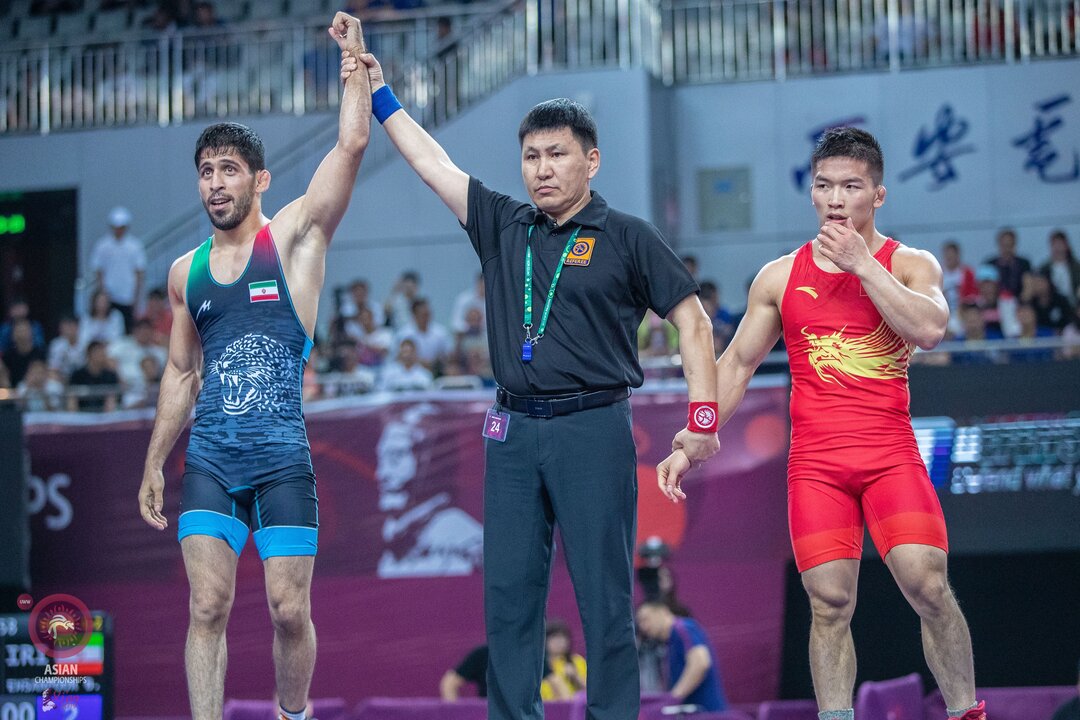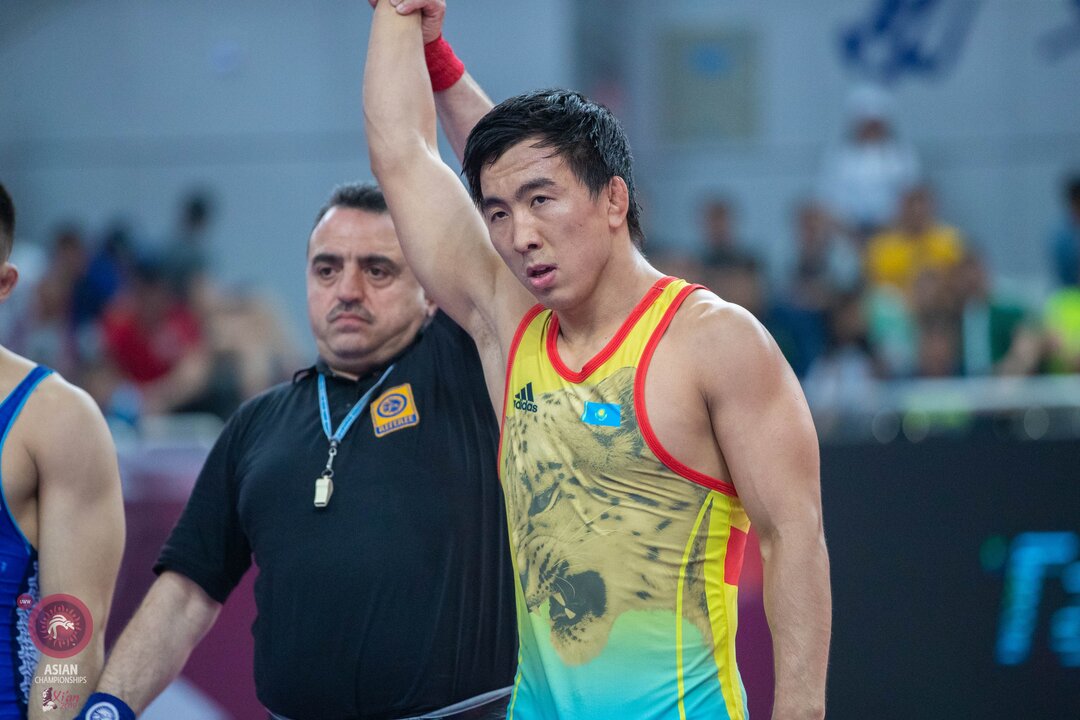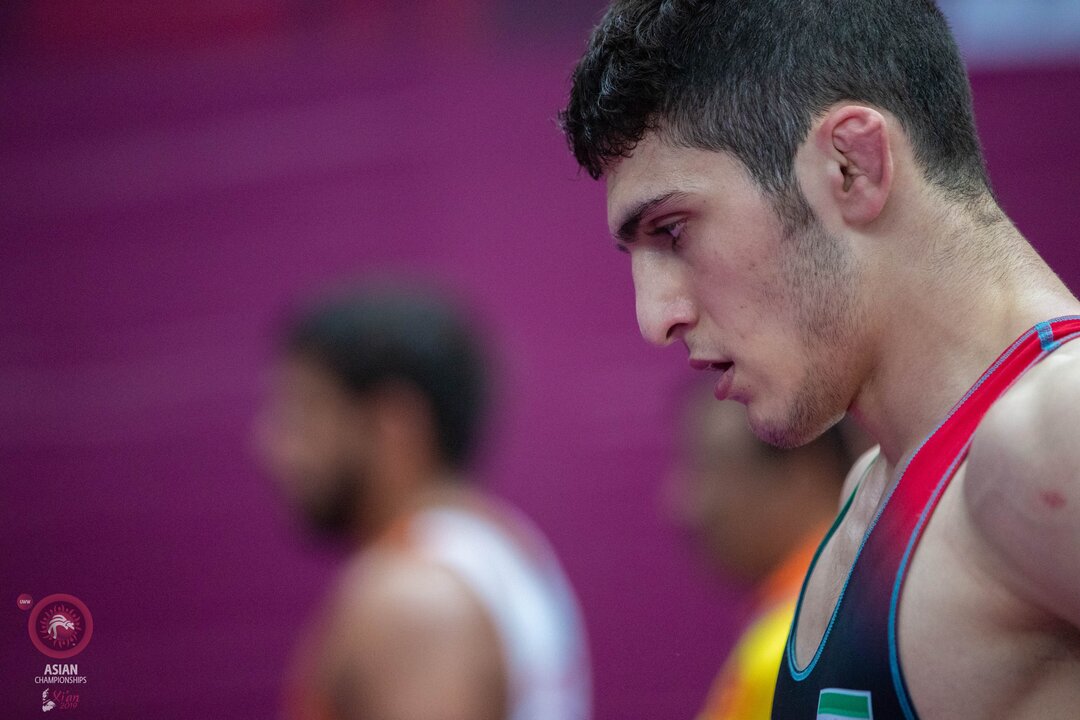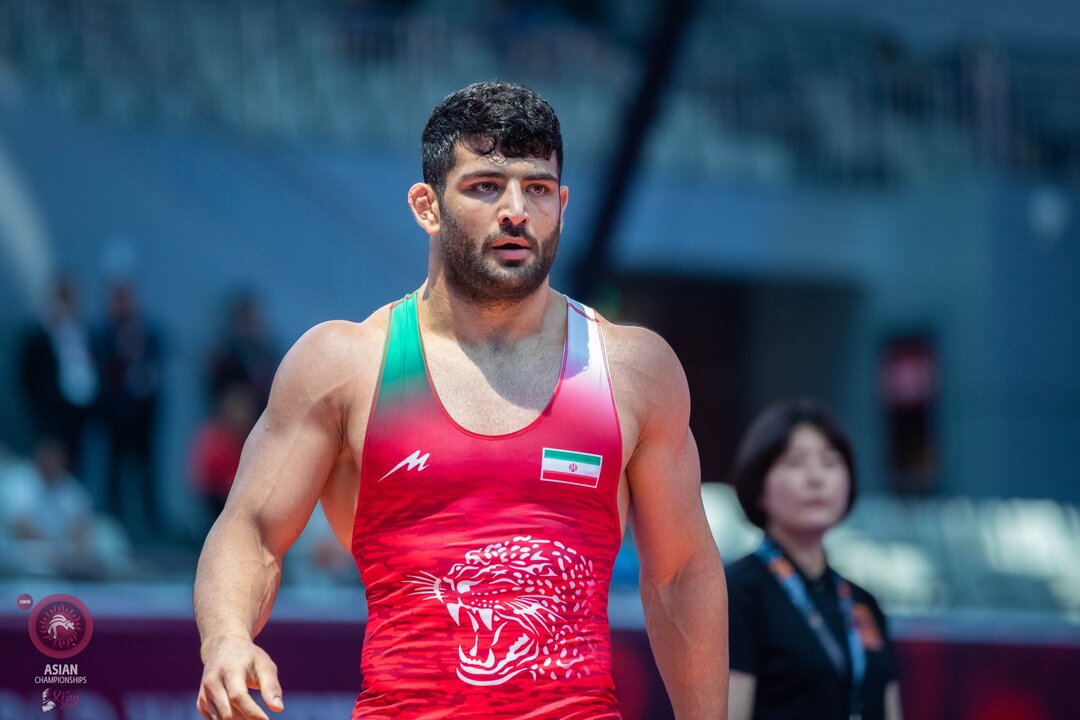AMMAN, Jordan (March 28) -- After five Women's Wrestling weight classes, it's turn for the remaining five -- 53kg, 57kg, 62kg, 65kg and 72kg -- at the Asian Championships which enters day four.
WATCH LIVE | LIVE MATCH ORDER | DAY 3 REPORT
72kg gold medal bout: Zhamila BAKBERGENOVA (KAZ) vs Yuqi LIU (CHN)
14:17: Yuqi LIU (CHN) earns a shot at adding the senior Asian 72kg gold to the U20 one she won last year when she notches a 5-2 victory over Svetlana OKNAZAROVA (UZB). Early in the first period, Liu misses an opportunity when she gets Oknazarova's leg into the air, only to see the Uzbek twist herself free. Liu gets an activity point and that accounts for the lone score of the first period. The action opens in the second period, and Liu scores with a single-leg takedown, but Oknazarova responds with a double-leg that puts Liu onto her back, but is scored only as a 2-pointer. Liu adds an insurance takedown on a counter.
14:15: Former world champion Masako FURUICHI (JPN) and four-time world medalist Zhamila BAKBERGENOVA (KAZ) battle it out in the 72kg semifinals and it's a snoozefest. Bakbergenova gets the 1-0 lead after Furuichi fails to score when put on activity clock in the first period. Furuichi gets the 1-1 criteria lead when Bakbergenova fails to score in the second. Bakbergenova is hit with another passivity in the second period and Furuichi leads 2-1 with 43 seconds on the clock. Bakbergenova gets Furuichi out of bounds but she is on her knees and it's called no points. Furuichi defends with all might but Bakbergenova scores the stepout this time to win 2-2. Bakbergenova with the win with 0.6 seconds left despite Japan's challenge.
65kg gold medal bout: Miwa MORIKAWA (JPN) vs. Enkhjin TUVSHINJARGAL (MGL)
14:02: World 59kg champion Qi ZHANG (CHN) manages to cut Miwa MORIKAWA (JPN) lead to 4-2 with a takedown but Morikawa gets two takedowns in the final minute and Zhang gets one. Morikawa wins 8-4 to enter the final at 65kg. In her only other Asian Championships appearance in 2022, Morikawa won gold but it was a round-robin bracket in which she did not get to celebrate the win in final, a fact she rued that year.
13:58: Enkhjin TUVSHINJARGAL (MGL) will get a chance to improve on her silver from last year, advancing to the 65kg final with victory by fall over Shakhzoda ALLANIYAZOVA (UZB). Tuvshinjargal gets in deep on a double, and when Allaniyazova goes over the top in defense, Tuvshinjargal twists backward for a 2-point exposure. She then works her way up to fall position and pins Allaniyazova down at 1:59.
62kg gold medal bout: Ok Ju KIM (PRK) vs MANISHA (IND)
13:54: After three consecutive bronze medals, MANISHA (IND) will finally be fighting for the gold when she chalks up a 5-1 victory at 62kg over Kalmira BILIMBEK KYZY (KGZ). Limited to an activity point in the first period, Manisha starts the second period with a stepout, then adds a snap-down takedown. She scores another stepout with a minute to go, then inadvertently gives up one when she goes out spinning behind for a takedown.
13:50: In perhaps the match of the semifinal session, Ok Ju KIM (KIM) secures the fall over Nonoka OZAKI (JPN) at 62kg. Kim tried the cradle, then went for the half-nelson before pinning Ozaki and make it to the 62kg final on international debut for the 24-year-old.
57kg gold medal bout: Il SIM SON (PRK) vs Sara NATAMI (JPN)
13:42: Il Sim SON (PRK) follows Natami by also bringing an early end to her 57kg semifinal, using a barrel roll to put Youngjin KWON (KOR) onto her back, then moving to a headlock and leg wrap to secure the fall in 2:08.
13:41: Kexin HONG (CHN) can't catch a break getting pinned via step overs from her opponents. Anastasia NICHITA (MDA) did it in the semifinals at the Paris Olympics now at the Asian Championships, Sara NATAMI (JPN) gets the fall.
53kg gold medal bout: Moe KIYOOKA (JPN) vs. Hyogyong CHOE (PRK)
13:40: In a much-anticipated clash between young stars, Moe KIYOOKA (JPN) goes on the offensive as expected in their 53kg semifinal and ANTIM (IND) does what she does best, fending off. For one period at least. Kiyooka, limited to an activity point in the first period, breaks through with Antim on the activity clock for a single-leg takedown, then adds a thigh-lock roll. The world 55kg champion then repeats the process to end the match with a 10-0 win in 4:10.
13:35: Hyogyong CHOE (PRK) takes only a minute and 13 seconds to complete her leg lace and win 10-0 against Otgontuya CHINBOLD (MGL) and reach the 53kg final.
Semifinals will begin 13:30 Amman time.
13:00: ANTIM (IND) with a low single as soon as the whistle goes for the 53kg quarterfinal against world U20 champion and senior world silver medalist Jin ZHANG (CHN). She adds a takedown to make it 4-0 inside the first minute. Zhang with a double hand lock throw but Antim survives the pin attempt. Another takedown for Antim and she leads 6-2 at the break. Antim adds another takedown with snapdown for an 8-2 lead. Her double underhooks help her defend whatever Zhang is throwing at her. Zhang gets two points after Antim defends with a chestwrap but Zhang exposes her. She adds another to cut the lead to 8-6. Both wrestlers in a tangle and referees call for a consultation. It is scored two for Antim, two for Zhang, giving Antim a 10-8 win. China challenge the decision. On review it is Antim is awarded two points twice and she wins 10-6
12:47: Enkhjin TUVSHINJARGAL (MGL) with a fall over Jeongae BARK (KOR) in the 65kg quarterfinal. Perfect headlock for the fall
12:44: Miwa MORIKAWA (JPN) had to launch a big four-pointer to lead 4-2 against Gaukhar MUKATAY (KAZ) in the 65kg quarterfinal.. Mukatay had countered the first attack secured a 2-0 lead. Morikawa begins the second period with a stepout. Step over defense from Morikawa to make it 9-2 before securing the fall with 1:46 left on the clock.
12:41: MANISHA (IND) muscles her way into the 62kg semifinals with a victory by fall over Hanbit LEE (KOR). As she receives an activity point, Manisha uses double underhooks on the mat to leverage Lee over and gains the fall in 2:25.
12:38: Kalmira BILIMBEK KYZY (KGZ) explodes for nine points in the second period to notch a 10-4 victory over Miyasar KUSHMURATOVA (UZB) and advance to the 62kg semifinals
12:36: Nonoka OZAKI (JPN) gets over a major hurdle in her quest for a third Asian gold when she grinds out a 4-1 victory over Lili LILI (CHN) to make the 62kg semifinals. Ozaki gets an activity point in the first period and early in the second to lead 2-0. She gets in on a single-leg and gets the leg into the air, only for Lili to mule-kick her way out of the predicament. Lili receives an activity point, adding to the tension as the clock ticks down. With :10 left, Lili attempts a last-ditch front headlock roll, but Ozaki stuffs it for a final 2.
12:33: Sara NATAMI (JPN) puts on a technical masterclass of takedowns and wins 11-0 against Bolortuya KHURELKHUU (MGL) to enter 57kg semifinals.
12:27: Moe KIYOOKA (JPN), last year's world and Asian champion at 55kg who has moved down to 53kg, puts on a takedown clinic in cruising to a 10-0 victory over Meng Hsuan HSIEH (TPE). She topped off her fourth takedown with a quick lace lock to end the match in 1:58.
12:25: Youngjin KWON (KOR) did not let Danielle LIM (SGP) from the headlock and secures the fall after a 7-0 lead to advance to the 57kg semifinals.
12:24: Shakhzoda ALLANIYAZOVA (UZB) loses a challenge for a counter to a counter-lift by Maysa YUSUPJANOVA (TKM) that would have ended the match on a technical fall, but goes on to pancake her opponent to mat and score an actual fall to advance to the 65kg semifinals.
12:21: Hyogyong CHOE (PRK) needs just 46 seconds to get a takedown against Zeinep BAYANOVA (KAZ), rip off four lace-lock rolls and secure her spot in the 53kg semifinals with a 10-0 win.
12:20: Bolortungalag ZORIGT (MGL) begins the 72kg quarterfinal with the typical Mongolian headlock throw for four against Yuqi LIU (CHN). Liu answers with a takedown but Zorigt leads 4-2. With just over a minute remaining, Liu gets Zorigt on her back to the mat and secures a fall and enter the semifinals.
12:20: Qi ZHANG (CHN) builds up a 7-2 lead in the first period against Asian U23 silver medalist Dilnaz SAZANOVA (KGZ). The two trade stepouts in the second period before Zhang adds a late takedown for a 10-3 win and a possible semifinal clash with Miwa MORIKAWA (JPN).
12:12: Il Sim SON (PRK) is into the semifinals at 57kg with a victory by fall over Sezim ZHUMANAZAROVA (KGZ).
12:10: Four-time world medalist Zhamila BAKBERGENOVA (KAZ) begins her quest for a third Asian gold and sixth medal overall with a 10-0 victory over Sehee KIM (KOR) to advance to the semifinals at 72kg. After her third takedown, Bakbergenova rolls Kim twice to end the proceedings.
12:08: Nonoka OZAKI (JPN), former Asian champion and Paris bronze medalist at 68kg, is back to 62kg. She had to make the desperate move to 68kg but losing the domestic qualifiers at 62kg in Japan. She defeated Ami ISHII (JPN) to get the spot at 68kg for Paris. She returned to 62kg at the Emperor's Cup and won the gold to qualify for Asian Championships. Up against Tserenchimed SUKHEE (MGL), Ozaki opens up a 4-0 lead before takedowns are exchanged and Ozaki leads 6-2 at the break. The second period starts with a single-leg attack from Ozaki for two. Sukhee is quick with her attacks as well but Ozaki resets and defends to score takedwon. Sukhee keeps shooting on the legs and score a stepout as Ozaki is feeling the heat of the weight cut. Another sweep single from Sukhee, Ozaki defends for a while but gives up another takedown as Sukhee cuts her lead to 10-5 with 25 seconds remaining. Sukhee attempts a big throw but Ozaki with a whizzer and secures a 12-5 win.
12:06: Masako FURUICHI (JPN), one of the few wrestlers on the planet who has completed the "Grand Slam" of all four world age-group titles, faces a rising star in her opening match at 72kg in Jyoti BERWAL (IND), the world U20 champion at 76kg. An actionless first period sees Berwal take a 1-0 lead into the second. It's more of the same, as Berwal gets an activity point, but gives up a penalty point. In the final 20 seconds, Furuichi comes to life and completes a single-leg takedown with :10 left for a 3-2 win.
12:05: Asian U23 bronze medalist Svetlana OKNAZAROVA (UZB) is trailing 2-0 when she slams Nurzat NURTAEVA (KGZ) to her back for a fall at 72kg. Nurtaeva was last year's Asian U23 champion at 68kg.
12:02: Meng Hsuan HSIEH (TPE), a silver medalist from 2021, with a buzzer-beating exposure to beat Shokhida AKHMEDOVA (UZB) at 53kg! Akhmedova was leading 5-3 but allowed Hsieh the leg attacks and while backtracking on her hips, there was exposure. Uzbekistan challenged but the decision was upheld as Hsieh won 6-5
11:57: Another historic first at these Asian Championships as Aylah MAYALI (PLE) becomes the first-ever female participant from Palestine when she faces Shakhzoda ALLANIYAZOVA (UZB) in a qualification-round match at 65kg. Allaniyazova opens the scoring with a double-leg takedown, then counters a Mayali shot to a stalemate. Allaniyazova adds another takedown at the edge to lead 4-0 at the break. In the second period, Allaniyazova gets a takedown and gut wrench, but Mayali reverses for her first points. In the end, the Uzbek proves too much and comes away with a 12-2 win, but not a bad effort for the debutante.
11:56: MANISHA (IND), last year's champion at 65kg, has dropped down to 62kg and starts strong with an 11-0 win over Asian U23 silver medalist. Tynys DUBEK (KAZ).
11:49: Il Sim SON (PRK), looking to do her part for DPR Korea in the team standings, starts off with a nice fireman's carry and never lets off the gas in posting an 11-0 win over Pei Ying LIAO (TPE) at 57kg in just under two minutes.
11:50: Jordan had its first wrestler in women's wrestling at the senior Asian Championships on Thursday and today Balqis TAAIBIN (JOR) is the second. However, she cannot produce a win for the hosts as Jeongae BARK (KOR) beats her 12-2 at 65kg.
11:45: Gaukhar MUKATAY (KAZ) with a headlock to fall over Dieu Thuong LAI (VIE) at 65kg. Lai was leading 6-0 but Mukatay with a reversal to get the fall.
11:42: World U23 bronze medalist Neha SHARMA (IND) advances at 57kg with an 8-1 victory over Nilufar RAIMOVA (KAZ), a 2023 Asian bronze medalist.
11:39: Qi ZHANG (CHN), last year's champion and the 2023 world chamipion at 59kg, gets her campaign at 65kg started with lightning quick 10-0 rout of MONIKA (IND).
11:38: Bolortuya KHURELKHUU (MGL) only got going in the second but she did well and secured a fall over Thi Hien DANG (VIE) after building a 14-7 lead.
11:38: In the opening match on Mat B, Nethmi PORUTHOTAGE (SRI) seemed on the road to a rare victory for Sri Lanka, using an impressive double-leg takedown in taking leads of 6-0 and 8-4, only to get caught in a cradle by Youngjin KWON (KOR) and lose by fall at 57kg.

 Behnam EHSANPOOR (IRI) won his second Asian title with a 2-1 win over China's LIU Minghu in the 61kg finals. (Photo: Sachiko Hotaka)
Behnam EHSANPOOR (IRI) won his second Asian title with a 2-1 win over China's LIU Minghu in the 61kg finals. (Photo: Sachiko Hotaka) Daniyar KAISANOV (KAZ), the 74kg gold medalist, was the non-Iranian Day 2 champion. (Photo: Sachiko Hotaka)
Daniyar KAISANOV (KAZ), the 74kg gold medalist, was the non-Iranian Day 2 champion. (Photo: Sachiko Hotaka) Mohammad NOKHODILARIMI (IRI) scored a bronze medal at 74kg with a 9-8 comeback win over Ilgiz DZHAKYPBEKOV (KGZ). (Photo: Sachiko Hotaka)
Mohammad NOKHODILARIMI (IRI) scored a bronze medal at 74kg with a 9-8 comeback win over Ilgiz DZHAKYPBEKOV (KGZ). (Photo: Sachiko Hotaka) Alireza KARIMIMACHIANI (IRI) grabbed the 92kg gold medal with an 11-0 victory over India's Viky VIKY (Photo: Sachiko Hotaka)
Alireza KARIMIMACHIANI (IRI) grabbed the 92kg gold medal with an 11-0 victory over India's Viky VIKY (Photo: Sachiko Hotaka)

Share your thoughts.
Comments